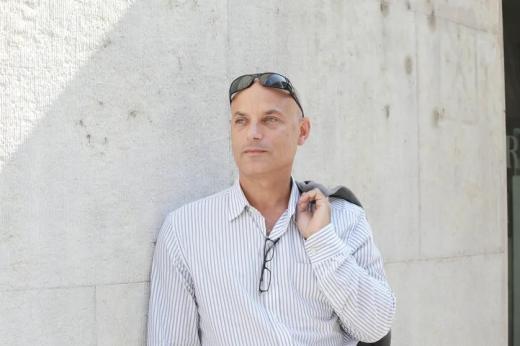
Citation de Williamine
Schmiel, of course, we know a little by this point. Indeed, after talking to Jack and the others I feel I can envision him quite clearly, for instance, on that day in the 1930's when one of the pictures I know so well was taken : walking through the centre of town (…), there, he is, walking through the Ringplatz (…). So, I can see him in my mind's eye, wearing a suite like that (…). There he is, tall, prosperous, a tiny bit self-important, perhaps. There he is, then, walking, being a big shot, a man who liked to be noticed, who enjoys being a somebody in the town, a person who very likely thought, until the very end, that returning to Bolechow from New-York was the best decision he'd ever made.
Later on things became difficult, and to this difficult period belongs the Shmiel of the letters, a vivid if perhaps slightly less appealing figure than the earlier, more grandious figure, a middle-aged and prematurely white-haired businessman and the brother, cousin, mishpuchah to his many correspondents in New-York, with whom he was reduced, as time went on, to pleading, hectoring, cajoling rather desperately and, it must be said, a little pathetically as he tried to find a way to preserve his family or, indeed, even a small part of it, the children, even one daughter, the dear Lorka. (Why her ? Because she was the oldest ? Because she was the favorite ? Impossible to know now.)
Still, at least, it's possible to hear Shmiel's voice, through the letters. Of Ester very little remains, now. (…)
Having now talked to every person still alive who had the opportunity to see and know Aunt Ester, I can report that almost nothing is left of this woman, apart form a handful of snapshots and the fact that she was very warm and friendly. (A woman, I can't help thinking as I contemplate the annihilation of her life – annihilation may seem at first excessive, but I merely use it here in its fullest etymological sense, to reduce to nothing – who would, in the normal course of things, (…) have died of say, (…) at the age of seventy-seven, although that is impossible to imagine, because she died so young and so long ago that she seems to belong wholly to the past, seems to have no claim on the present. And yet there's no reason, apart from the obvious one, that she should'nt have been someone I knew, someone like all those other mysterious old people who'd appear at family events when I was growing up ; just as the four girls, who will always be young, ought to have been the middle-aged “Polish cousins” whom we'd have visited in, say, the mid 1970's, my siblings and I, some summer. When I mentioned this strange notion to my brother Andrew, he paused for a moment and said, Yeah, it makes you realize that the Holocaust wasn't something that simply happened, but is an event that's still happening.
(page 230)
Later on things became difficult, and to this difficult period belongs the Shmiel of the letters, a vivid if perhaps slightly less appealing figure than the earlier, more grandious figure, a middle-aged and prematurely white-haired businessman and the brother, cousin, mishpuchah to his many correspondents in New-York, with whom he was reduced, as time went on, to pleading, hectoring, cajoling rather desperately and, it must be said, a little pathetically as he tried to find a way to preserve his family or, indeed, even a small part of it, the children, even one daughter, the dear Lorka. (Why her ? Because she was the oldest ? Because she was the favorite ? Impossible to know now.)
Still, at least, it's possible to hear Shmiel's voice, through the letters. Of Ester very little remains, now. (…)
Having now talked to every person still alive who had the opportunity to see and know Aunt Ester, I can report that almost nothing is left of this woman, apart form a handful of snapshots and the fact that she was very warm and friendly. (A woman, I can't help thinking as I contemplate the annihilation of her life – annihilation may seem at first excessive, but I merely use it here in its fullest etymological sense, to reduce to nothing – who would, in the normal course of things, (…) have died of say, (…) at the age of seventy-seven, although that is impossible to imagine, because she died so young and so long ago that she seems to belong wholly to the past, seems to have no claim on the present. And yet there's no reason, apart from the obvious one, that she should'nt have been someone I knew, someone like all those other mysterious old people who'd appear at family events when I was growing up ; just as the four girls, who will always be young, ought to have been the middle-aged “Polish cousins” whom we'd have visited in, say, the mid 1970's, my siblings and I, some summer. When I mentioned this strange notion to my brother Andrew, he paused for a moment and said, Yeah, it makes you realize that the Holocaust wasn't something that simply happened, but is an event that's still happening.
(page 230)









